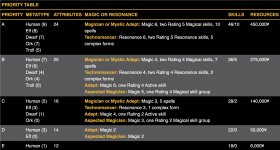I have been thinking about this for a bit and wanted to discuss it and see if we could collectively come up with a way to make it happen.
I think there should be a power level dial that is independent of character level. That is, a set of rules adjustments that you can easily set to a preferred power level for characters that takes effect at level 1 and stays consistent and relevant throughout the campaign.
It seems to me the dial would adjust at least the following things: ability score array, hit dice size, healing rate, number of feats, and ability uses rest/recovery mechanics. For example, the high powered dial might give an array like 18, 17, 16, 15, 14, 12, increase hit dice by 2 steps, give bonus feats at every other level, etc... A low powered dial would have a meager array, decrease hit die types, and limit access to healing. That sort of thing.
As a starting point,: what specific areas do you think a Power Dial should impact, and how would you implement it?
I think there should be a power level dial that is independent of character level. That is, a set of rules adjustments that you can easily set to a preferred power level for characters that takes effect at level 1 and stays consistent and relevant throughout the campaign.
It seems to me the dial would adjust at least the following things: ability score array, hit dice size, healing rate, number of feats, and ability uses rest/recovery mechanics. For example, the high powered dial might give an array like 18, 17, 16, 15, 14, 12, increase hit dice by 2 steps, give bonus feats at every other level, etc... A low powered dial would have a meager array, decrease hit die types, and limit access to healing. That sort of thing.
As a starting point,: what specific areas do you think a Power Dial should impact, and how would you implement it?

